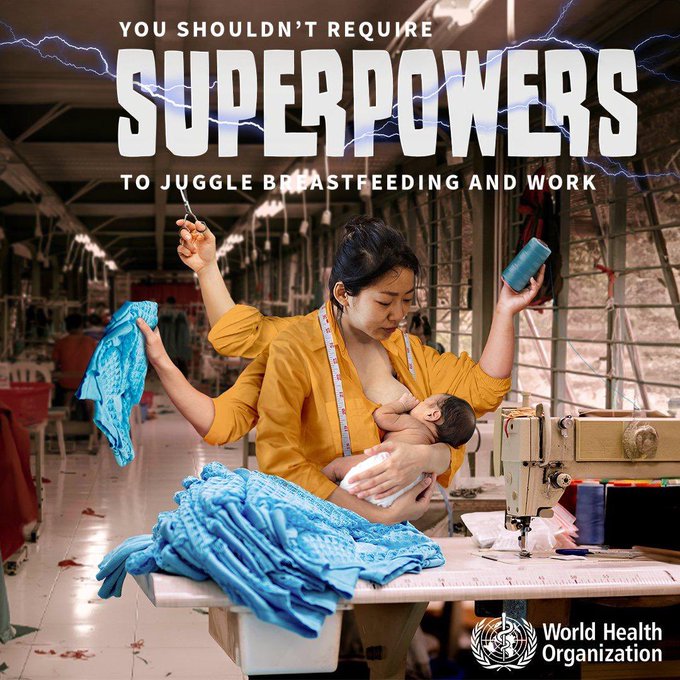Last Updated on August 4, 2023 2:39 am by INDIAN AWAAZ
You shouldn’t require superpowers to juggle breastfeeding and work; WHO
AMN / WEB DESK
- More than half a billion working women are not given essential maternity protections in national laws
- Just 20% of countries require employers to provide employees with paid breaks and facilities for breastfeeding or expressing milk
- Fewer than half of infants under 6 months of age are exclusively breastfed.

Breastfeeding is one of the most effective ways to ensure child health and survival. However, contrary to WHO recommendations, fewer than half of infants under 6 months old are exclusively breastfed.
Breastmilk is the ideal food for infants. It is safe, clean and contains antibodies which help protect against many common childhood illnesses. Breastmilk provides all the energy and nutrients that the infant needs for the first months of life, and it continues to provide up to half or more of a child’s nutritional needs during the second half of the first year, and up to one third during the second year of life.
Breastfed children perform better on intelligence tests, are less likely to be overweight or obese and less prone to diabetes later in life. Women who breastfeed also have a reduced risk of breast and ovarian cancers.
Inappropriate marketing of breast-milk substitutes continues to undermine efforts to improve breastfeeding rates and duration worldwide.
Statement by Catherine Russell and Dr Tedros Adhanom Ghebreyesus on World Breastfeeding Week

In the last 10 years, many countries have made significant progress to increase exclusive breastfeeding rates. Yet even greater progress is possible when breastfeeding is protected and supported, particularly in the workplace.
This World Breastfeeding Week, under its theme, “Let’s make breastfeeding at work, work” – UNICEF and WHO are emphasizing the need for greater breastfeeding support across all workplaces to sustain and improve progress on breastfeeding rates globally.
In the last decade, the prevalence of exclusive breastfeeding has increased by a remarkable 10 percentage points, to 48 per cent globally. Countries as diverse as Cote d’Ivoire, Marshall Islands, the Philippines, Somalia and Viet Nam have achieved large increases in breastfeeding rates, showing that progress is possible when breastfeeding is protected, promoted, and supported.
However, to reach the global 2030 target of 70 percent, the barriers women and families face to achieve their breastfeeding goals must be addressed.
Supportive workplaces are key. Evidence shows that while breastfeeding rates drop significantly for women when they return to work, that negative impact can be reversed when workplaces facilitate mothers to continue to breastfeed their babies.
Family-friendly workplace policies – such as paid maternity leave, breastfeeding breaks, and a room where mothers can breastfeed or express milk – create an environment that benefits not only working women and their families but also employers. These polices generate economic returns by reducing maternity-related absenteeism, increasing the retention of female workers, and reducing the costs of hiring and training new staff.
From the earliest moments of a child’s life, breastfeeding is the ultimate child survival and development intervention. Breastfeeding protects babies from common infectious diseases and boosts children’s immune systems, providing the key nutrients children need to grow and develop to their full potential. Babies who are not breastfed are 14 times more likely to die before they reach their first birthday than babies who are exclusively breastfed.
Supporting breastfeeding in the workplace is good for mothers, babies, and businesses, and that is why UNICEF and WHO are calling on governments, donors, civil society, and the private sector to step up efforts to:
- ensure a supportive breastfeeding environment for all working mothers – including those in the informal sector or on temporary contracts – by having access to regular breastfeeding breaks and facilities that enable mothers to continue breastfeeding their children once they return to work;
- provide sufficient paid leave to all working parents and caregivers to meet the needs of their young children. This includes paid maternity leave for a minimum of 18 weeks, preferably for a period of six months or more after birth; and
- Increase investments in breastfeeding support policies and programmes in all settings, including a national policy and programme that regulates and promotes public and private sector support to breastfeeding women in the workplace.
